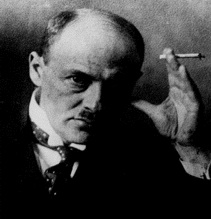
Max Scheler (1874–1928) was an early 20th-century German Continental philosopher in the phenomenological tradition.[1] Scheler's style of phenomenology has been described by some scholars as “applied phenomenology”: an appeal to facts or “things in themselves” as always furnishing a descriptive basis for speculative philosophical concepts. One key source of just such a pattern of facts is expressed in Scheler’s descriptive mapping of human emotional life (the “Stratification of Emotional Life”) as articulated in his seminal 1913–1916 work, Formalism in Ethics and Non-Formal Ethics of Values.[2]
- ^ Max Scheler, Selected Philosophical Essays. Trans. David R. Lachterman. “The Idols of Self-Knowledge,” “Ordo Amoris,” “Phenomenology and the Theory of Cognition,” “The Theory of Three Facts,” and “Idealism and Realism” (Evanston: Northwestern University Press, 1973) editor’s introduction, pp. xi-xiv.
- ^ Manfred S. Frings, Max Scheler: A Concise Introduction into the World of a Great Thinker (Milwaukee: Marquette University Press, 1996), p. 21.